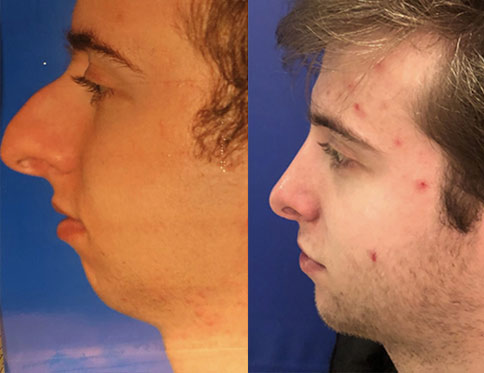Facelift Rancho Cucamonga: Reverse the Clock with Advanced Anti-Aging Solutions
Facelift Rancho Cucamonga: Reverse the Clock with Advanced Anti-Aging Solutions
Blog Article
Investigating the Psychological and Social Variables That Drive Individuals to Take Into Consideration Plastic Surgery as a Way of Improvement
The choice to go after cosmetic surgical treatment frequently extends past simple aesthetics, intertwining with mental and social characteristics that warrant thorough examination. Variables such as self-worth, prevalent social beauty criteria, and the prevalent influence of social media converge to form private motivations for surgical enhancement.
The Role of Self-worth
Self-worth significantly influences an individual's choice to pursue plastic surgery. People with low self-confidence frequently perceive themselves in an unfavorable light, causing sensations of insufficiency regarding their physical appearance. This negative self-perception can drive them to look for medical interventions as a technique of boosting their self-image. The need for renovation in one's appearance is frequently linked to a belief that such adjustments will certainly raise their general self-regard and self-confidence.

Ultimately, the duty of self-esteem in the decision-making process pertaining to plastic surgery highlights the complex interaction in between body picture, individual contentment, and psychological wellness. Comprehending this connection is critical for healthcare professionals to ensure that clients are making notified decisions rooted in practical expectations and emotional health.
Social Beauty Criteria
Influenced by pervasive media portrayals and cultural stories, social appeal standards play an important function in shaping individuals' perceptions of their own bodies. These requirements are usually identified by an idealized kind of appeal that stresses attributes such as proportion, slimness, and youthfulness. As these ideals are perpetuated with various networks, including television, movie, and advertising and marketing, individuals often internalize these messages, bring about frustration with their natural look.
The effects of these societal standards extend beyond aesthetic preferences; they can affect self-worth, mental health, and interpersonal partnerships. People who perceive themselves as disappointing these criteria might experience feelings of inadequacy, prompting a need for plastic surgery as a way of accomplishing societal authorization. This quest is usually sustained by the belief that satisfying these suitables will enhance not only physical look however also social standing and individual satisfaction.

Impact of Social Network
The impact of societal appeal criteria is further amplified by the surge of social networks platforms, where curated images and idealized depictions of charm are common. Customers are continuously exposed to filteringed system and edited photographs, which commonly show unattainable physical features. This direct exposure cultivates a society of contrast, leading individuals to analyze their own appearance against these usually unrealistic criteria.
Social network influencers and stars regularly promote cosmetic procedures, stabilizing the concept that surgical enhancements are a practical means for attaining societal suitables (plastic surgery rancho cucamonga). The exposure of these enhancements can develop an understanding that going through plastic surgery is a typical method, thereby affecting people to think about similar interventions as a path to improved self-confidence and social approval
Moreover, the interactive nature of social media allows for prompt responses with sort and comments, further strengthening the see this here need to satisfy prominent elegance criteria. Such communications can exacerbate feelings of insufficiency and drive people towards cosmetic surgical procedure as a way of acquiring recognition. Ultimately, social media plays a critical role in shaping understandings of charm, which considerably affects the decision-making processes bordering plastic surgery.

Social Perspectives on Look
Throughout numerous societies, understandings of appearance are deeply rooted in historic, social, and economic contexts, shaping people' views on charm and worth. In numerous societies, look serves as a significant marker of identification, affecting social status, specialist chances, and personal connections. As an example, in some societies, light skin is commonly related to wealth and benefit, while others may idealize darker skin tones as signs of strength and credibility.
In addition, conventional appeal standards are frequently perpetuated via social narratives, media depictions, and household affects, leading to differing ideals across different areas (plastic surgery rancho cucamonga). In Western cultures, the emphasis on young people and fitness often drives people towards aesthetic improvement, while in specific Eastern cultures, even more refined adjustments lined up with standard aesthetic appeals might be preferred
Globalization and the expansion of electronic media have even more complicated these dynamics, creating a hybridization of charm perfects that transcends geographical limits. As individuals significantly browse these social narratives, the stress to satisfy certain look requirements can lead to the wish for plastic surgery, showing a find out here now complicated interplay of social worths and individual ambitions. Comprehending these cultural point of views is crucial in attending to the motivations behind cosmetic surgery considerations.
Psychological Effects of Plastic Surgery
Numerous people seeking cosmetic surgical treatment report experiencing extensive psychological effects that can significantly modify their self-perception and emotional health - plastic surgery rancho cucamonga. The wish for physical improvement usually stems from underlying issues such as low self-confidence, body dysmorphic problem, or social pressures regarding elegance criteria. For some, the immediate post-operative phase can result in a short-term boost in self-esteem and contentment with their appearance, fostering a sense of empowerment
Nevertheless, these positive sensations might not be withstanding. Study shows that while some people experience boosted self-confidence, others may face elevated anxiety or clinical depression if their assumptions are not satisfied. This disparity can emerge from unrealistic perfects perpetuated by media depiction and cultural narratives surrounding charm.
Moreover, the mental ramifications of plastic surgery expand past the person. Relationships with friends and family might be stressed as social dynamics shift, bring about sensations of seclusion or alienation. Ultimately, the mental impacts of cosmetic surgery are multifaceted and intricate, needing mindful factor to consider by both prospective clients and medical care suppliers to make sure informed decision-making and practical expectations.
Verdict
Finally, the decision to pursue published here plastic surgery is considerably affected by a mix of self-confidence concerns, social appeal standards, and cultural point of views on appearance. The prevalent reach of social media sites better aggravates these pressures, promoting unrealistic suitables that individuals typically aim to achieve. Understanding these emotional and social factors is crucial for dealing with the motivations behind plastic surgery, highlighting the need for a much more nuanced conversation bordering elegance and self-acceptance in contemporary society.
The decision to pursue cosmetic surgical treatment commonly expands beyond mere aesthetic appeals, linking with social and psychological characteristics that warrant extensive exam. Ultimately, social media plays a crucial function in shaping perceptions of charm, which dramatically impacts the decision-making procedures bordering cosmetic surgical treatment.
As people progressively browse these cultural stories, the stress to conform to particular appearance requirements can lead to the need for cosmetic surgical procedure, mirroring a complex interaction of cultural values and personal ambitions.In final thought, the choice to pursue cosmetic surgical treatment is significantly influenced by a mix of self-esteem problems, societal appeal requirements, and social viewpoints on appearance. Recognizing these social and emotional elements is important for attending to the motivations behind cosmetic surgical procedure, highlighting the need for an extra nuanced discussion surrounding appeal and self-acceptance in modern culture.
Report this page